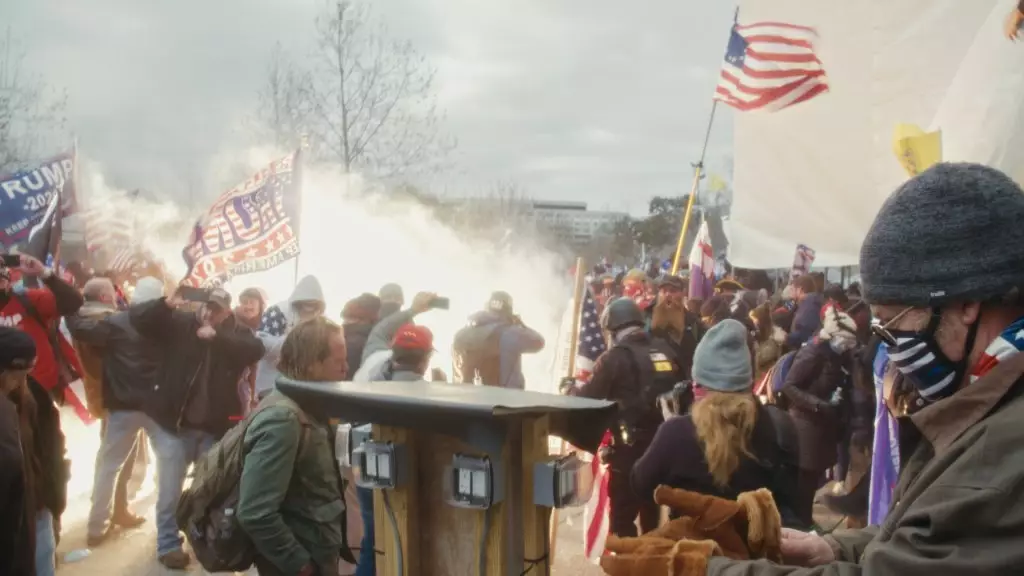“Fight Like Hell,” directed by Jon Long, sets itself apart as an ambitious feature documentary aiming to explore the events surrounding the January 6 riot at the United States Capitol. Premiering exclusively on YouTube on September 24, the documentary promises an unprecedented look into this pivotal moment in American history, utilizing high-definition footage captured by a RED camera. The film seeks to present an unembellished narrative, devoid of partisan commentary, which many documentaries have previously fallen victim to. This decision invites viewers to experience the raw events leading up to the Capitol riot, starting long before the 2020 election concluded.
The film’s synopsis emphasizes its commitment to unbiased storytelling, stating, “Without partisan narration or commentary, the film immerses the viewer into the Stop the Steal movement.” This approach signifies an essential departure from many contemporary narratives that are often fraught with political bias. By centering the documentary around the phenomena that escalated into chaos on January 6, “Fight Like Hell” seeks to provide the audience with not just a factual recounting of events, but a deeper understanding of the implications and stakes of this turmoil for American democracy.
One of the most intriguing aspects of “Fight Like Hell” may lie in its inclusion of key figures integral to the events surrounding January 6. Among them are Roger Stone, Steve Bannon, Rudy Giuliani, and Ret. Lt. Gen. Michael Flynn. Each figure embodies different facets of the burgeoning Stop the Steal movement, and their diverse narratives provide a multifaceted perspective on the events leading to the riot.
Roger Stone, often considered a cornerstone of the Stop the Steal movement since its inception in 2016, showcases the long-standing efforts to contest electoral outcomes in America. His relationship with Trump, particularly his commutation of felony convictions, magnifies the intertwined nature of power, influence, and accountability within the political sphere. Similarly, Steve Bannon’s presence in the documentary reflects the strategies and ideologies that have shaped modern political rhetoric.
Moreover, Rudy Giuliani’s role accentuates the legal battles that were fought in the wake of the election results, while Michael Flynn’s story provides insight into the military and security implications of the January 6 events. By featuring these prominent figures, the documentary does not just recount events but also frames the larger narrative of a politically charged America, divided by ideological lines.
Jon Long’s director statement highlights the documentary’s intent to confront the complexities surrounding January 6. He points out the confusion and division that have permeated discussions about the events, stating that the persistent “us vs. them” mentality complicates genuine understanding. Such reflections underscore the responsibility of the media to delve deeper and present information with nuance and clarity.
Long’s vision for “Fight Like Hell” is rooted in a desire to push back against media echo chambers that distort perceptions of reality. The director aims to equip viewers with a broader context, thereby encouraging critical thought and reflection. He acknowledges that while January 6 was one of the most reported events in recent U.S. history, the narrative has often been clouded by sensationalism and political allegiances, leaving crucial aspects of the story obscured.
The title of the film itself harkens back to President Trump’s statements on January 6, which incited a massive crowd to march toward the Capitol. The phrase “stop the steal” encapsulates the central theme the documentary examines—the lengths to which individuals and groups will go to protect or contest their beliefs about democracy and legitimacy.
In doing so, Long’s documentary presents a challenge to viewers: to engage with and reflect on the fragility of democracy. This critical exploration could inspire necessary dialogue about the role of citizens in safeguarding democratic institutions, especially in turbulent times.
Overall, “Fight Like Hell” aims to shed light on a critical moment in U.S. history, compelling audiences to not only witness the events but also to understand the broader societal implications. The film’s approach of presenting unbiased information encourages viewers to navigate their own interpretations of this complex narrative—inviting a much-needed conversation about the future of democracy in America.


Leave a Reply